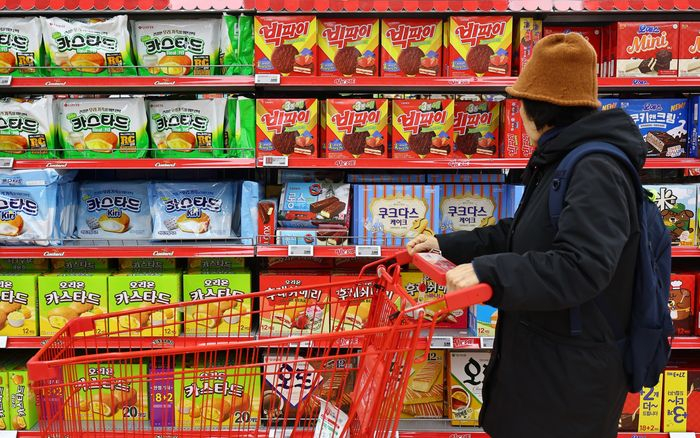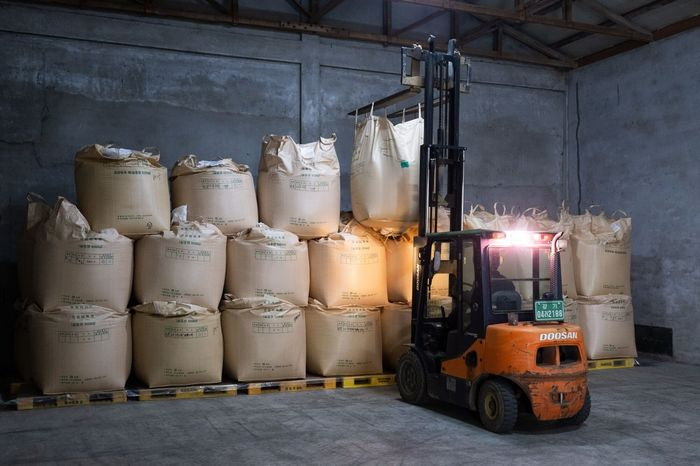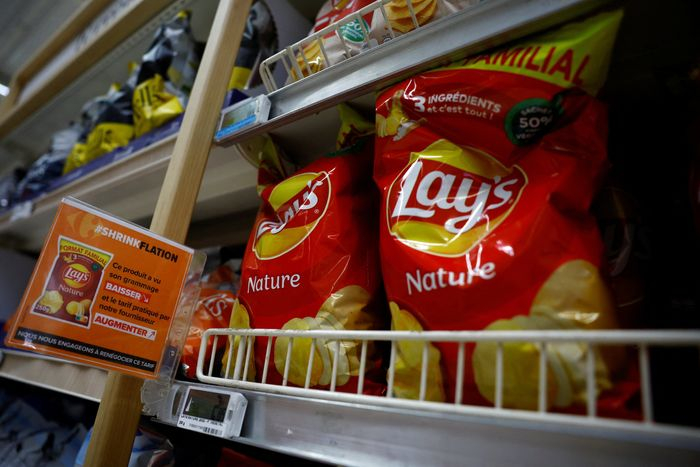Food & Beverage
This country will police ‘shrinkflation’ at the supermarket
South Korea will soon require companies that slim down products to show the old and new sizes on packaging
By The Wall Street Journal Dec 27, 2023 (Gmt+09:00)
4
Min read
Most Read
LG Chem to sell water filter business to Glenwood PE for $692 million


KT&G eyes overseas M&A after rejecting activist fund's offer


Kyobo Life poised to buy Japan’s SBI Group-owned savings bank


StockX in merger talks with Naver’s online reseller Kream


Meritz backs half of ex-manager’s $210 mn hedge fund



SEOUL—Food prices have risen so much that Kim Soo-yeon has developed a suspicious new habit at the grocery store. She has taken to shaking bags of her favorite brands of potato chips to see if they feel lighter.
“If companies are reducing the amount of food by unnoticeable amounts, it feels deceptive,” said the 32-year-old office worker in Seoul.
South Korean authorities will soon be backing her up in the supermarket aisles.
Seeking to temper the effects of inflation, many countries have sought to use political pressure to dissuade food makers from gouging consumers — with higher prices or lower volumes. South Korea is taking things a step further.
Starting next year, the country will require companies to disclose on their packages and websites when grocery items drop in volume, but not price. To ensure firms comply, South Korea is establishing a dedicated price-investigation team to monitor any fluctuations. Officials are considering levying fines, too.
South Korea’s muscular response to “shrinkflation” reflects how a sluggish economy—its projected full-year growth of 1.4% is roughly half that of other wealthy countries—has become a major problem for President Yoon Suk Yeol, whose approval ratings remain stuck in the mid-30s. Those unhappy with Yoon most commonly cite economic issues.
The new proposals to fight shrinkflation came as the government unveiled an initial list of violators. Following a monthlong investigation, authorities said the offerings of everything from beer to Vienna sausages to dumplings had quietly gotten smaller. Some 16 variants of flavored almonds had shrunk, too.
Choi Si-yeon, a 28-year-old office worker, said she was angry when she found out about what had happened with her favorite wasabi-flavored almonds. Each bag contained 20 grams less, a seemingly undetectable amount.
“If they had raised the price, at least some consumers would notice,” Choi said.

The maker of the snack, a South Korean firm called HBAF, for Healthy But Awesome Flavors, said it had disclosed the product-size changes on its website. The firm pointed to the pandemic, a rise in labor costs and almond prices as factors.
Other companies also claimed to have made online disclosures or argued the slimmed-down offerings were part of flavor revamps.
Shrinkflation backlash has emerged elsewhere, too. France’s second-largest supermarket chain, Carrefour, has put up bright orange signs to highlight products it deems subject to shrinkflation since September. In the U.S., Sen. Bob Casey (D., Pa.) recently issued a report on shrinkflation, citing facial tissues and Oreos as examples.
With costs rising, what is often lacking is transparency over potential changes, creating room for a sense of injustice when shrinkflation occurs, said Rajiv Biswas, chief economist for the Asia-Pacific region at S&P Global Market Intelligence. “Consumers can’t check the website of hundreds of products,” he said.
Headline inflation in South Korea topped out at 6.3% in July 2022 from the prior year, below the recent peaks of 9.1% in the U.S. and 11.1% in the U.K. But food prices in the East Asian country had remained relatively low for decades, so the recent upticks have triggered outsize anger. Wages haven’t kept pace with rising prices. The country’s housing market—the main source of wealth for many South Koreans—has stagnated.
A majority of South Koreans plan to spend less money next year, according to a recent poll, with nearly half of respondents citing inflation as the chief reason.
Low inflation had been a particular policy priority for South Korea over the decades, helping the country’s export-heavy economy maintain a good environment for private investment, said Randall Jones, a former senior official at the Organization for Economic Cooperation and Development who led the group’s economic reports on South Korea.
“People aren’t used to inflation in South Korea,” said Jones, who is now a distinguished fellow at the Korea Economic Institute of America, a think tank based in Washington, D.C.

South Korea is conducting daily price checks for more than two dozen staple items such as milk and ramen noodles. The country’s antitrust regulator will list any shrinkflation examples on a newly created website and will handle enforcement of the new measures. The government wants to ink agreements with large South Korean retailers to build a joint monitoring system for some 10,000 everyday items.
That sliced cheese and other inexpensive items were among the first named shrinkflation violators irks people like Lee Hyun-woo, a 23-year-old university student. “If even processed food is shrinking, I feel betrayed,” Lee said.
In recent weeks, the country’s shrinkflation suspicions have touched everything from the cubed white radish accompanying Korean fried chicken to the cream density of a slice of strawberry cake.
Kim Young-hee, a 42-year-old homemaker, is glad about more government transparency. But the extra knowledge likely won’t change her habits, such as her occasional purchase of honey-butter almonds for her children.
“I’ll still buy the almonds,” Kim said, “but I don’t want to be tricked.”
Write to Timothy W Martin and Dasl Yoon at Timothy.Martin@wsj.com
and dasl.yoon@wsj.com
More to Read
-

-
 EconomySouth Korea to boost aid for chipmakers to $23 billion, expanding extra budget
EconomySouth Korea to boost aid for chipmakers to $23 billion, expanding extra budgetApr 16, 2025 (Gmt+09:00)
-
 AutomobilesSouth Korea announces emergency support for auto sector against US tariffs
AutomobilesSouth Korea announces emergency support for auto sector against US tariffsApr 09, 2025 (Gmt+09:00)
-
 EconomyChina says it is aiming to coordinate tariff response with Japan, South Korea
EconomyChina says it is aiming to coordinate tariff response with Japan, South KoreaApr 02, 2025 (Gmt+09:00)
-

Comment 0
LOG IN


